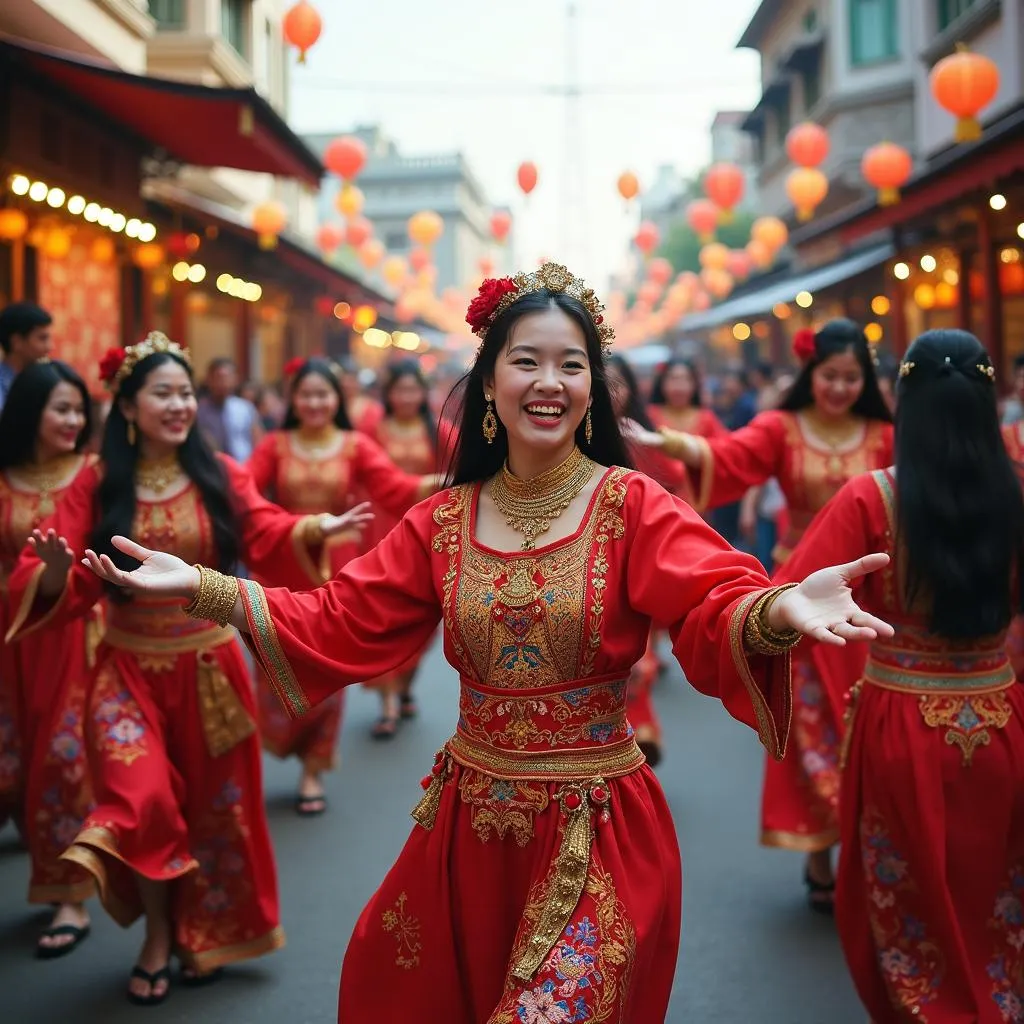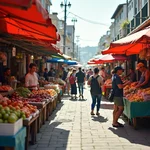The topic of describing a cultural event attended in another country is a popular one in IELTS Speaking tests. It allows examiners to assess candidates’ ability to discuss cross-cultural experiences, use descriptive language, and express personal opinions. This topic has appeared frequently in past tests and is likely to remain relevant in future exams.
Part 1: Introduction and Interview
In this section, the examiner may ask general questions about cultural events and travel experiences. Here are some potential questions:
- Do you enjoy attending cultural events?
- Have you ever been to a cultural event in another country?
- What types of cultural events are popular in your country?
Let’s consider a sample answer for the second question:
Examiner: Have you ever been to a cultural event in another country?
Sample answer (Band 7-8):
“Yes, I have. A few years ago, I had the opportunity to attend the Diwali festival in India. It was a truly eye-opening experience that left a lasting impression on me. The vibrant colors, intricate decorations, and joyful atmosphere were unlike anything I’d ever seen before. It really gave me a deeper appreciation for Indian culture and traditions.”
Describe a city known for its cultural heritage can be an interesting topic to explore further if you’re interested in discussing cultural experiences in urban settings.
Part 2: Long Turn
Here’s a sample cue card related to the topic:
Describe a cultural event you attended in another country
You should say:
- What the event was
- Where and when you attended it
- Who you were with
- And explain why this event was memorable for you
 Cultural event attended in another country
Cultural event attended in another country
Sample answer (Band 6-7):
“I’d like to talk about a cultural event I attended in Japan last year. It was the Gion Matsuri, a famous festival held in Kyoto every July. I was there with a couple of friends who were also visiting Japan.
The festival was incredibly lively, with huge floats called yamaboko parading through the streets. We saw people dressed in traditional kimonos and enjoyed trying various Japanese street foods. The atmosphere was electric, with crowds of people lining the streets to watch the procession.
What made this event memorable was the sense of community I felt, even as a foreigner. Everyone was so welcoming and friendly, eager to explain the festival’s traditions to us. It was also visually stunning, with all the colorful decorations and intricate floats.
This experience really opened my eyes to Japanese culture and made me appreciate how important these traditions are to the local people. It was definitely a highlight of my trip and something I’ll never forget.”
Sample answer (Band 8-9):
“I’d like to share my experience of attending the Carnival of Venice in Italy two years ago. This world-renowned festival, known for its elaborate masks and costumes, takes place annually in February, transforming the city into a living theatre.
I was fortunate enough to visit with my sister, who’s an art history enthusiast. We were utterly mesmerized by the spectacle unfolding before us. The narrow streets and squares of Venice were teeming with revelers adorned in intricate, baroque-style costumes and mysterious masks, creating an atmosphere that felt like stepping back in time to the Renaissance era.
What struck me most was the juxtaposition of this centuries-old tradition against the backdrop of Venice’s timeless architecture. The Grand Canal served as a majestic stage for boat parades, while the Piazza San Marco hosted masquerade balls that seemed straight out of a fairy tale.
This event was particularly memorable because it epitomized the preservation of cultural heritage in a modern world. The craftsmanship evident in the costumes and masks was awe-inspiring, showcasing the dedication to keeping these ancient arts alive. Moreover, the festival’s ability to unite people from all walks of life in a shared celebration was truly remarkable.
Experiencing the Carnival of Venice broadened my cultural horizons and gave me a profound appreciation for how traditions can evolve yet retain their essence over time. It was a vivid reminder of the power of cultural events to bridge gaps between past and present, locals and tourists, creating a universal language of joy and creativity.”
Describe a recent social gathering you attended can provide additional insights into discussing social events and interactions.
Follow-up questions:
- How did this event differ from cultural events in your own country?
- What did you learn about the local culture from this experience?
Sample answer for question 1 (Band 8-9):
“The Carnival of Venice was strikingly different from cultural events in my country in several aspects. Firstly, the scale and grandeur of the event were unparalleled. While we have festivals, they rarely engulf an entire city for weeks. Secondly, the level of artistic expression through costumes and masks was far more elaborate than anything I’ve seen at home. Lastly, the historical significance and continuity of tradition spanning centuries set it apart. It felt like a living museum of cultural heritage, which is quite distinct from our more contemporary celebrations.”
Part 3: Two-way Discussion
Examiner: How do you think cultural events contribute to a country’s identity?
Sample answer (Band 7-8):
“Cultural events play a significant role in shaping a country’s identity. They serve as a window into the nation’s history, traditions, and values. These events often showcase unique aspects of a culture, such as traditional music, dance, or cuisine, which helps to distinguish one country from another.
Moreover, cultural events can foster a sense of unity among citizens by bringing people together to celebrate shared heritage. They also provide an opportunity for different generations to connect, ensuring that cultural knowledge and practices are passed down through the years.
For tourists, these events offer a deeper insight into the local way of life, going beyond surface-level observations. This can lead to greater cultural understanding and appreciation on a global scale.
In essence, cultural events act as a living expression of a country’s identity, helping to preserve traditions while also allowing for cultural evolution and adaptation over time.”
Describe a forest or park you visited that left a strong impression on you can provide an interesting contrast when discussing different types of memorable experiences.
Examiner: Do you think globalization is causing cultural events to become more similar worldwide?
Sample answer (Band 8-9):
“The impact of globalization on cultural events is indeed a complex and nuanced issue. On one hand, there’s no denying that globalization has led to a certain degree of homogenization in some aspects of cultural celebrations. We see this in the widespread adoption of events like Halloween or Valentine’s Day in countries where they weren’t traditionally celebrated.
However, I believe it would be overly simplistic to conclude that globalization is causing all cultural events to become more similar. In fact, in many cases, globalization has paradoxically strengthened local cultural identities. As cultures come into contact with one another, there’s often a renewed interest in preserving and promoting unique local traditions.
Moreover, globalization has facilitated the cross-pollination of ideas, leading to innovative fusions of different cultural elements. This can result in events that are neither fully traditional nor completely homogenized, but rather a creative blend that reflects our interconnected world.
It’s also worth noting that many countries are making concerted efforts to safeguard their intangible cultural heritage, often with support from international organizations. This has led to a resurgence of interest in traditional festivals and customs.
In conclusion, while globalization certainly influences cultural events, I believe it’s more accurate to say that it’s transforming rather than simply homogenizing them. The challenge lies in striking a balance between embracing global connections and maintaining cultural distinctiveness.”
Describe a festival you look forward to every year can provide additional context for discussing the importance of cultural events.
Key Vocabulary and Phrases
-
Cultural immersion /ˈkʌltʃərəl ɪˈmɜːʃən/ (noun): The process of becoming deeply involved in a culture different from one’s own.
Example: “Attending the Carnival of Venice provided a deep cultural immersion experience.” -
Intangible heritage /ɪnˈtændʒəbəl ˈherɪtɪdʒ/ (noun): Cultural practices, representations, expressions, knowledge, and skills that are passed down through generations.
Example: “Traditional dances performed at festivals are part of a country’s intangible heritage.” -
Cross-cultural exchange /krɒs ˈkʌltʃərəl ɪksˈtʃeɪndʒ/ (noun): The sharing of ideas, customs, and experiences between different cultures.
Example: “Cultural events often facilitate cross-cultural exchange between locals and tourists.” -
To bridɡe the gap /tə brɪdʒ ðə ɡæp/ (phrasal verb): To connect or create understanding between different groups or cultures.
Example: “Participating in local festivals can help bridge the gap between different communities.” -
Cultural diversity /ˈkʌltʃərəl daɪˈvɜːsəti/ (noun): The existence of a variety of cultural groups within a society.
Example: “The festival celebrated the cultural diversity of the region through various performances and exhibitions.”
Describe an interesting local event you attended can provide additional practice in using these vocabulary items in context.
 Cultural immersion experience
Cultural immersion experience
Examiner’s Advice
To achieve a high score in the IELTS Speaking test when describing a cultural event:
-
Use rich vocabulary: Incorporate descriptive language and idiomatic expressions to bring your experience to life.
-
Provide specific details: Don’t just give general information; include specific aspects of the event that made it unique or memorable.
-
Express personal opinions: Share your thoughts and feelings about the experience, explaining why it was significant to you.
-
Maintain fluency: Practice speaking about various cultural events to improve your ability to discuss the topic smoothly and confidently.
-
Demonstrate cultural awareness: Show your understanding of the cultural significance of the event and how it relates to the local traditions and values.
-
Use a range of tenses: Incorporate past, present, and future tenses as appropriate when discussing your experience and its impact.
-
Connect ideas coherently: Use linking words and phrases to connect your thoughts and create a well-structured response.
Remember, regular practice and exposure to diverse cultural topics will help you feel more comfortable and perform better in the IELTS Speaking test.


